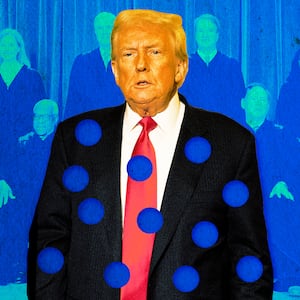President Donald Trump was up late Monday night trying to bully the Supreme Court into upholding his signature economic policy by warning of a national “drubbing” if it went against him.
Two key justices had sounded skeptical during oral arguments about whether Trump’s sweeping tariffs on imports from dozens of U.S. trading partners are valid under the International Emergency Economic Powers Act.
But conservative Justice Amy Coney Barrett also noted during her questioning that reimbursing almost $90 billion in tariffs already paid by American businesses would be a “mess.”
Trump has previously acknowledged in interviews that the government would have to pay back businesses if the Supreme Court strikes down the duties, and now he’s trying to argue it would be even worse than Barrett realized.

“The U.S. Supreme Court was given the wrong numbers. The ‘unwind’ in the event of a negative decision on Tariffs, would be, including investments made, to be made, and return of funds, in excess of 3 Trillion Dollars,” he wrote at about 12:30 a.m. Tuesday in a Truth Social post. “It would not be possible to ever make up for that kind of a ‘drubbing.’”

The president has repeatedly claimed that the tariffs are responsible for companies pledging to invest trillions of dollars in U.S. manufacturing, though he hasn’t provided any evidence that the number is anywhere near $3 trillion.
It’s also not a given that those investments, which include Apple’s planned $600 billion domestic manufacturing program, depend on the tariffs.
If they do, Congress could always approve the policy, since the central question in the case is whether Trump exceeded his authority by unilaterally imposing the duties.
Trump has nevertheless described the tariffs in existential terms and previously claimed that an adverse Supreme Court ruling could reduce the U.S. to “almost Third World status.”
In his latest post, he wrote that striking down the tariffs “would truly become an insurmountable National Security Event, and devastating to the future of our Country - Possibly non-sustainable!”
The post, however, undermined the legal argument that Solicitor General D. John Sauer tried to make Wednesday during oral arguments: that raising revenue was “only incidental” to Trump’s tariffs.
The duties are a type of import tax paid by American companies, which must eat the costs or pass them on to their customers. Last month, a report from Goldman Sachs found that consumers are shouldering as much as 55 percent of the cost of Trump’s tariffs.

Given that the Constitution expressly gives Congress the power to impose taxes, the administration has argued that the case is really about the president’s ability to regulate foreign powers, and not about raising revenue.
In the weeks leading up to Wednesday’s oral arguments, the administration had tried to downplay the policy’s money-making potential, The New York Times reported. The court is not expected to hand down a definitive ruling until next year.
After first claiming that the tariff revenue would offset the president’s $4 trillion tax cut—most of which benefits the wealthiest Americans—the administration has now begun describing the tariffs as a “surcharge” similar to a driver’s license fee, the Times reported.
The Daily Beast has reached out to the White House for comment.








